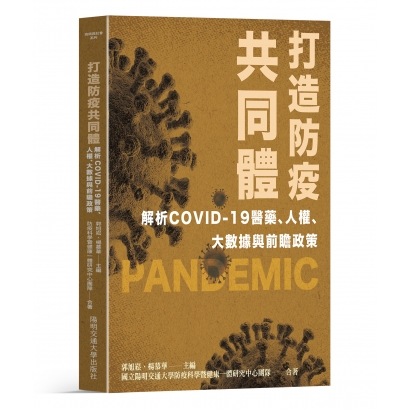A COLLECTION OF MORE THAN 20 ARTICLES FROM EXPERTS IN THE FIELDS OF MEDICINE, LAW, AND BIG DATA COMPREHENSIVELY ANALYZE THE IMPACT OF COVID-19 ON TAIWAN, THE WORLD, AND STRATEGIES FOR RESPONSE
The COVID-19 pandemic has significantly impacted societies worldwide, exposing the need for a thorough examination and proposal of future strategies in various aspects of epidemic prevention, human rights, the rule of law, and the rapid integration of new technologies. This book brings together research and significant insights from experts in the fields of medicine, law, and big data to comprehensively analyze COVID-19 from multiple perspectives. It aims to contribute to building a consensus on how to enhance social rule of law, human rights, and epidemic prevention, while also serving as a reference for policy formulation.
Volume 1, “Interpreting Real-world Information,” provides detailed explanations of COVID-19 transmission, testing methods, post-infection symptoms, and preventive measures.
Volume 2, “Human Rights, Rule of Law, and Epidemic Prevention,” delves into Taiwan’s epidemic prevention experience and discusses issues related to democratic epidemic prevention on campuses, technological measures, and legal preparations for epidemic prevention materials. Additionally, it explores international human rights, vaccine distribution justice, and trust in epidemic prevention knowledge.
Volume 3, “The Real World Under Big Data,” examines the effectiveness of Taiwan’s COVID-19 prevention measures and government efficiency based on big data analysis. It also extensively discusses the analysis of online public opinion since the outbreak of the pandemic. This volume includes a special section on the “Cloud-based Invisible Hypoxia Monitoring Platform,” which aids in detecting hidden hypoxia promptly.
The final volume, “Forward-looking Policies to Build an Epidemic Prevention Community,” not only addresses medical innovation and epidemic prevention but also legislative responses in the United States, and vaccine product comparison between the United States and the European Union, incorporating foreign perspectives and observations. Furthermore, it analyzes the emergency use authorization under the “Pharmaceutical Affairs Act” Article 48-2, the link between COVID-19 and the National Health Insurance, and the planning of Asia-Pacific medical and epidemic prevention special zones.
Recommendation:
“The unity of the people and the support of professionals from all sectors are crucial forces for epidemic prevention in Taiwan. Let us work together to create an epidemic prevention community that upholds human rights and the rule of law.” – Chen Shih-Chung (Commander of the Central Epidemic Command Center, Minister of Health and Welfare)
